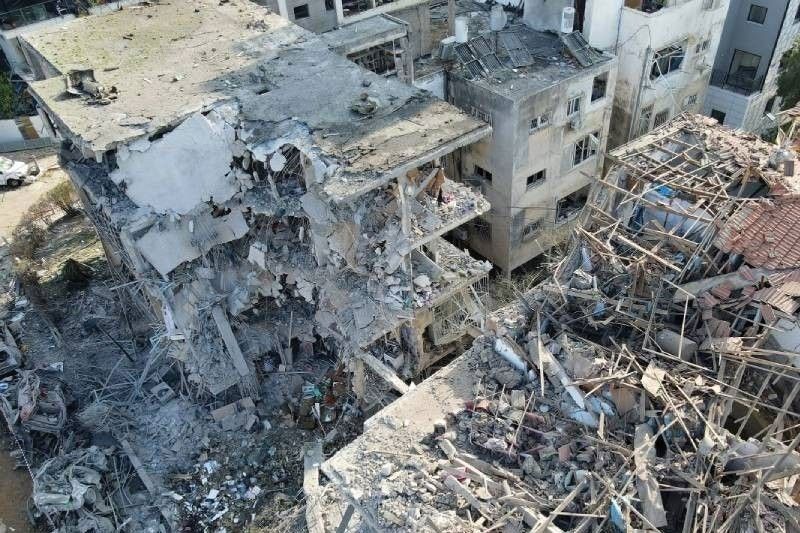
Upgrade to High-Speed Internet for only ₱1499/month!
Enjoy up to 100 Mbps fiber broadband, perfect for browsing, streaming, and gaming.
Visit Suniway.ph to learn
Cristina Chi - Philstar.com
April 21, 2025 | 6:03pm
MANILA, Philippines — Philippine troops will not "participate" in any potential conflict between China and Taiwan, a ranking Armed Forces of the Philippines official said on Monday, April 21.
"The Philippines has renounced war as a means of its national policy. So if ever there will be conflict in Taiwan, the Philippines will not participate. And we will still continue to defend our territory and the Philippines," said Major General Francisco Lorenzo Jr., the Philippines' exercise director for this year's Balikatan exercises.
Lorenzo also shared that the possibility of a Taiwan invasion was not "considered" in planning this year's Balikatan joint exercises.
He made these statements at a press conference following the opening ceremony of the military drills, which will involve nearly 14,000 troops from the Philippines and the United States in operations simulating a "full-scale battle scenario" over the next three weeks.
For decades, China has claimed Taiwan as its territory despite Taiwan functioning as a self-governed island. The dispute has grown more tense in recent years, with China conducting military exercises near Taiwan more frequently, some of which has been described as practice for surrounding and isolating the island.
The Philippines' geographic position places it in a precarious situation regarding any Taiwan conflict. Batanes, the country's northernmost province, lies approximately 100 miles south of Taiwan.
AFP Chief of Staff Gen. Romeo Brawner Jr. on April 1 told troops to be ready "in case there is an invasion of Taiwan" during his speech at Northern Luzon Command's 38th anniversary program. The AFP later clarified this was primarily focused on non-combatant evacuation operations for the approximately 250,000 Filipino workers in Taiwan, not actual military engagement.
The 1987 Constitution declares in Article II, Section 2 that the nation "renounces war as an instrument of national policy," a foundational principle that guides the country's approach to international conflicts.
On Monday, both Lorenzo and his US counterpart, Doug Krugman, staff officer of the US's 1st Marine Expeditionary Forces and senior exercise planner for Balikatan 2025, were adamant that Taiwan invasion scenarios were not part of the Balikatan military drills.
RELATED: Balikatan 2025 to feature 'ship-killer' system in 'full battle test'
"So far, we have not considered that in our planning. And what we do is we are committed to the attainment of an open and free trade in the Pacific. That's what we plan and intend to achieve during the Balikatan," Lorenzo said.
Similarly, when explicitly asked whether the possibility of a Taiwan invasion was included in the planned activities for Balikatan, Krugman said: "I would say no."
"We're looking at elevated tensions in regional security in the larger region, in this case focused on the South China Sea," he added.
While he acknowledged that Beijing's takeover of Taiwan would trigger heightened tensions in the regions, Krugman said this is an "extreme example."
"What I would say is that there is no specific call out of an individual location or nation. This is not intended to be provocative in any way," Krugman said. "This is intended to test amongst 20 nations our mutual integration, the collaboration, organizations that we've created."
When pressed on whether deterring potential conflict in the Taiwan Strait was part of the joint Philippine-US strategy, Lorenzo maintained that the Philippines' focus remains on its territorial defense.
"The Balikatan exercises may probably help deter the conflict in Taiwan," he said. "But for our concern, it is only for the deterrence of any possible coercion or invasion to our country."
RELATED: Pentagon chief says US will ensure 'deterrence' across Taiwan Strait
The Balikatan exercises, which means "shoulder-to-shoulder" in Filipino, are the largest annual joint military drills between Manila and Washington, both share a defense treaty that compels them to defend the other in case of armed attacks.
This year's activities will include missile defense, counter-landing live-fire exercises, and maritime strike capabilities, among others.
The Philippines follows the "One China" principle and recognizes the People's Republic of China as the sole Chinese government.

 2 months ago
16
2 months ago
16



